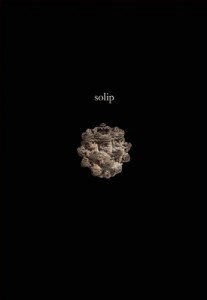2012 by Joanne Kyger
 2012
2012
by Joanne Kyger
Blue Press, 2013
$10.00 / Buy from Blue Press
Joanne Kyger periodically taught in the now defunct Poetics Program at New College of California, much as she still teaches now and then at Naropa. Over a decade ago I had the pleasure of being a student in one of those classes. We officially focused on “the serial poem” reading books by Jack Spicer, Ed Dorn, Alice Notley, and Ed Sanders, but more vitally the class was an uncompromising lesson in the wider practice of living—with poetry happening to be our focus—one among many of life’s daily occurrences.
A serial poem in its own right, 2012 exemplifies how fluidly Kyger’s writing practice is a sustained fact of her life. This journal-like suite of nine poems, presented in chronological order with dates of composition, is well representative of her ongoing engagement with the world via poetry over the last half-century. The writing is finely sculpted if often deceptive in giving off a carefree it’s-all-no-big-deal vibe. Of course, the simultaneous action of these characteristics only contributes towards how totally great the poems actually are.
Reading Kyger’s work is to take part in sharing her daily intimacy concerning wildlife, gossip, books read, current events, past memories, friendships, and more, all balanced by her keen awareness of detail. Observation is her abiding practice and discipline. Who’s that and what’s it doing?
The deer here spend all their lives
in a two mile radius.
The back yard is
ankle deep in pellet poo
They are practically domesticated
The fearless male quail hops right over
the red shafted flicker
pecking the new grass.
(“The Epic of World Mythology” Dec 26, 2012)
May 24th, 2013 / 11:00 am
In The House Upon The Dirt Between The Lake And The Woods
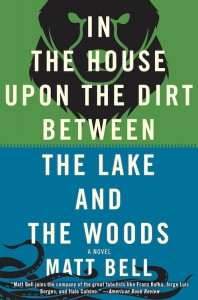 In The House Upon The Dirt Between The Lake And The Woods
In The House Upon The Dirt Between The Lake And The Woods
by Matt Bell
Soho Press, June 2013
312 pages / $15.27-25 Preorder from Amazon or Soho Press
It’s too easy to describe Matt Bell’s work as mythic. A lot about it is, but what makes it such a valuable addition to the field of stuff you can read is not just the way it draws from and modernizes mythic structures, but the way it burns through those structures to touch the awe and terror that gave rise to them. In The House Upon The Dirt Between The Lake And The Woods, his phenomenal debut novel, tells a story about barrenness and fertility that is also a story about the fight to heave off the expectations and limitations of mythic storytelling.
Bell writes with the leisurely flow of an oral epic, and his unnamed, communally defined characters (“my wife,” “our false son”) have as much lineage in ancient Greece and Scandinavia as they do in contemporary America, but instead of aspiring to the oral epic’s universal openness, In The House aspires to its own brand of claustrophobic intimacy. The narrator speaks like a bard but his story is his own, his voice unmistakably first-person.
This story is filled with quests, labyrinths, and totem animals, taking its shape partly from Orpheus (a husband seeks his wife along a seemingly never-ending downward path), and partly from Faust (this man fends off invitations to cowardice offered by a devilish miscarried boy living in his guts), but it strips these familiar elements of their cultural baggage and moral agendas. Free of what’s boring and overdetermined about them, they start to feel a lot stranger and more dangerous.
May 24th, 2013 / 11:00 am
“…I am from here / and in these very same places / I now leave my balance.”
 Over at Typo, Guillermo Parra has put together (with the help of many scholarly friends/friendly scholars) a collection of Venezuelan poetry (1921-2001) nuzzled-into-English. It really makes your hair feel softer, these poems. There are trails that crawl both uphill and downhill. There are fugitive instants that barely contain your breathing. There is the spooky insistence of overwhelming presence when you think you want to be alone. Like José Antonio Ramos Sucre explains: “I would like to stay between the empty dark, cruelty on earth hurts my senses, life an affliction.” But “They followed me on horseback with their black dogs.” Almond trees and leopards. Owls putting shirts on their fathers. Pistol vapors vs. peaceful sleep. Cañabrava wood and mangrove beams. Boats with chimneys, ham wrapped in aluminum foil. Selfhood as a long dark hike both inside and out. Or on its stomach to watch TV, or facing the ceiling to be loved. Patricia Guzmán, for example, has always wanted to learn how to sing, and she says so to her sisters:
Over at Typo, Guillermo Parra has put together (with the help of many scholarly friends/friendly scholars) a collection of Venezuelan poetry (1921-2001) nuzzled-into-English. It really makes your hair feel softer, these poems. There are trails that crawl both uphill and downhill. There are fugitive instants that barely contain your breathing. There is the spooky insistence of overwhelming presence when you think you want to be alone. Like José Antonio Ramos Sucre explains: “I would like to stay between the empty dark, cruelty on earth hurts my senses, life an affliction.” But “They followed me on horseback with their black dogs.” Almond trees and leopards. Owls putting shirts on their fathers. Pistol vapors vs. peaceful sleep. Cañabrava wood and mangrove beams. Boats with chimneys, ham wrapped in aluminum foil. Selfhood as a long dark hike both inside and out. Or on its stomach to watch TV, or facing the ceiling to be loved. Patricia Guzmán, for example, has always wanted to learn how to sing, and she says so to her sisters:
I’ve told them to listen to me
I’ve told them to let me know I sing
I’ve told them not to kiss me on the mouth while I sing
Not to invite anyone to hear me
A PRIMARY INTEREST IN EVERYTHING THAT SURROUNDS THE SUBJECT
and how to eclipse the object
retake
like the spatial configuration of what it means to be in love
do you want to learn how to float
[Samuel Beckett // Ill Seen Ill Said // Nohow On]
The Mean Interview with Ken Baumann, Author of Solip
Shane: As a fourteen year old, you’re extremely accomplished – acting, writing, pornography. Do other kids give you a hard time about your success?
Ken: To clarify: I performed in my last pornographic film at 14. However, I am currently 23 years old. I would get confused about this, too. Right now, I’m unemployed and writing books that will almost definitely burn up in the churning indifferent fires of time. Define success?
Shane: Sex. Drugs. Women. Pigs. God worship. Eat whatever you want and stay skinny. That’s how I would define success and you’ve had it all. Millions of fans watch your show each week. How does it feel to publish a book no one will read?
Ken: Sex? Well, yes. Okay. Sex is correct. Women? I’m married, but that’s how I like it. So check. Pigs? I eat so much pork, so check. God worship? You mean like I worship a god? Or that I’m worshipped as a god? For the latter, I don’t know if you’d call a gaggle of fourteen year olds in the nascent days of their purchasing abilities as godlike, but god is found in the accidental miracle of life and blah blah blah, I guess. Okay, that counts. But it’s more like “eat whatever I want and get hospitalized” these days. So okay: 4 out of 6. I guess… a few people will read SOLIP? I think it’s sold 100–200 copies. But there could be future Jeffersons in there, bub. Future Jobs’s’s. Future Guy Who Made Penicillin’s!
Shane: Interesting. Very very interesting. You like being interesting.
Ken: …
Shane: What’s the most expensive cup of coffee you’ve bought in Hollywood?
Ken: I don’t drink coffee.
Shane: There’s a video – you, Gian, Blake – dumping coffee on a homeless person.
Ken: The homeless person in question was a paid extra who “desperately” needed his SAG-AFTRA card, and that was not coffee, it was dirt. How can I take this interview seriously if you don’t get the basic facts right?
Shane: Dirt, right. Solip is a rich, challenging, language based text void of narrative with flashes of Salmon Beckers. Tell me, what’s it like to be nominated for a Teen Choice Award?
Ken: Being nominated for a Teen Choice Award and then not winning kind of feels like signing with Penguin and then having your second book fail. You whine about that a lot, right?
Shane: Salmon Beckers, Wallace Sterns, Brent Butters, a lady named Joyce – these are all influences for you. I’m curious, when you talk about these influences, your ideas on philosophy, your marriage to Rumor Willis, what do people find the most annoying to listen to?
Ken: Probably all of it. And I can’t even begin to issue corrections with this one. Do you have a speech-to-typing impediment or something?
Shane: Knock knock
Ken: Please stop.
Shane: It’s a literary joke. Knock knock.
Ken: Who’s there.
Shane: Ken Baumann
Ken: Ken Baumann who?
Shane: That’s what the New York Times said.
Ken: …
Shane: Get it?
Ken: …
Shane: The cover doesn’t have your name, Solip is written very small, and there’s a blurry snail. How upset are you in the printing error?
Ken: You missed the secret message in the cover? Huh.
Shane: Ever skin a goat?
Ken: I’ve skinned a few things, but not a goat. :*(
Shane: When is ABC Family making a show about Solilp?
Ken: When your mom greenlights it.
Shane: Word association time. I’m going to say something and you write back the first word that pops up in your sex crazed drug filled hollywood head.
Ken: Sure.
Shane: Ken Baumann.
Ken: Very, very tired.
Shane: Thank you for doing this interview, Ben. Solip is a really artsy, experimental, dense work of poetic prose. I wish you the best of luck with your acting career.
Ken: …
Hello Poetry Lovers
“Hello Poetry Lovers”
from Quinta Essentia Vol. 0 written and read by Blaster Al Ackerman
video by Cristine Brache (using stock and found footage)
for the O, Miami Poetry Festival 2013
Dear everyone,
What would you most like to see at this site? More posts about writing and craft? More posts about Viktor Shklovsky? Jimmy Chen being forced to post something every single day? The violent death of a current contributor? The return of Boobs Friday? The creation of Bollocks Friday? Sandra Bullock Friday? Spout off and maybe by working together, you and I, we can make it happen …
I STILL DON’T “GET” POETRY READINGS
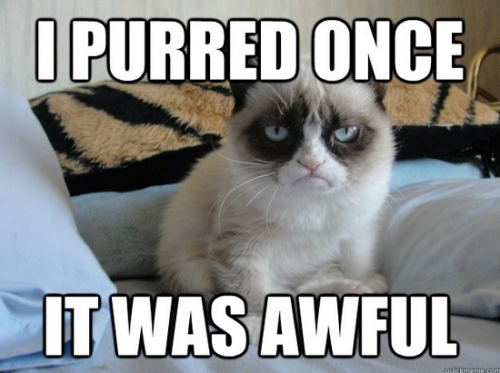
A few weeks ago, I gave poetry readings a hard time on HTMLGIANT. When I wrote the article, I was aware of its potential to generate conversation. However, I had no idea just how much conversation it would generate.
To everyone who participated in the conversation, thank you. I can’t say that I liked everything that everyone had to say (just as many of you didn’t like what I had to say), but that’s okay. Everyone’s allowed an opinion. In fact, as creatures of language, it’s impossible for us not to have opinions because language relies on difference in order to make meaning; or at least that’s what I think Derrida would say. It’s only sensible then that our opinions (not just yours and mine on this particular matter but everyone’s opinion on anything/everything) should often differ.
To get to why I’ve titled this article “I Still Don’t ‘Get’ Poetry Readings,” though, I’ll tell you it’s because I don’t. I don’t “get” poetry readings. I don’t “get” them not for a lack of trying. I don’t “get” them because I don’t understand what readings hope to achieve within the broader framework of culture. I’ve been to many poetry readings, some of which have moved me so deeply that I cried (Tomaž Šalamun) and some of which have failed to reach me (though also not for a lack of trying). Despite how very different poetry readings can be from one another, I’ve noticed that they all share the same quality of autonomy. It seems to me that the poetry reading desires to be a space that exists for itself and through itself. My complaint, however, isn’t with the poetry reading’s desire for autonomy but rather with the inaccessibility this desire creates.
In my last article, the solution I was pushing for was to make poetry readings more “accessible,” more transparent. Here, I’m pushing for the same idea. Accessibility is what defines the Electronic Age in which we live. Accessibility is about mass consumption, and mass consumption is about power.
In this essay, as well as in the last, I’m urging poetry readings to actualize their full potential: to realize their power.
I’ve read through all the responses to my first article on both HTMLGIANT and Facebook (no, I’m not friends with Hoa Nguyen, but her wall is public), and I strongly feel that my last essay was deeply misunderstood. To clarify the position of my last essay, I’ll respond to a few of the responses that point to its underpinnings.
I think the response that best contextualizes my first article and the meaning I intended it to summon forth is this one:
“I am old and I leave my keys in the refrigerator. I look out the window at the moon and imagine that we’ve never been there. Not a single, damned one of us.”
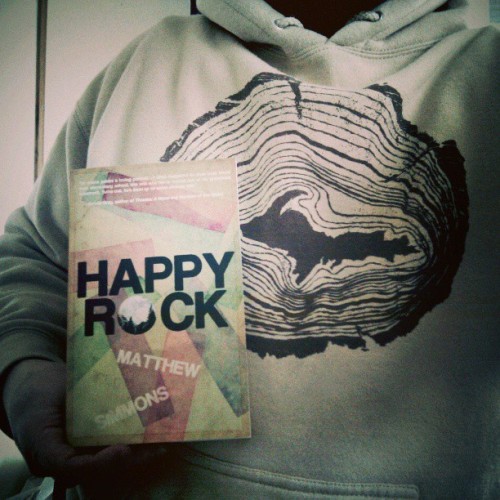 Happy Happy Rock day! Happy Rock is a book of stories by Matthew Simmons, seen at left wearing a shirt that’s about Michigan or something. If you have ever walked home through snowdrifts in the wrong shoes, and the only thing keeping your knees above collapse was the thought of your cat or your twelve-sided die, you will hold Happy Rock as tenderly as Matthew does in this picture. Except it will be open and you will be reading it. Everything is a kind of love story if by love you mean grey sand.
Happy Happy Rock day! Happy Rock is a book of stories by Matthew Simmons, seen at left wearing a shirt that’s about Michigan or something. If you have ever walked home through snowdrifts in the wrong shoes, and the only thing keeping your knees above collapse was the thought of your cat or your twelve-sided die, you will hold Happy Rock as tenderly as Matthew does in this picture. Except it will be open and you will be reading it. Everything is a kind of love story if by love you mean grey sand.



You will read it and be sighing because it’s right, it’s right, over and over again it’s smart and sad and correct. Here is a mention of a story way from the scarred beaches of 2010. And here is my favorite paragraph besides the ending from “Rabbit Fur Coat,” a story from Happy Rock that just went live a few days ago on The Collagist:
“Back home Boy went to the bathroom. Younger, he played a game where he had to leave the bathroom before the refilling of the toilet ended, imagining it as the countdown to an explosion. Older, he didn’t mind, but sometimes saw himself blown through the wall; ripped apart by hot, swift gusts of fiery air; scattered; his fingers embedded in the plaster; the bones of his toes like nails into the floor; his teeth, shrapnel. Now he rubbed his eyes. His grandmother knocked on the door to call him to the dinner table.”
The Nation Versus The Norton Postmodern Anthology Disaster (2nd Edition)
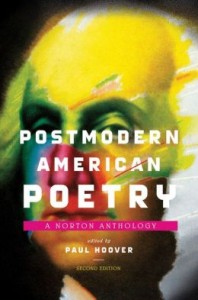
RE: Postmodern American Poetry: A Norton Anthology (2nd Edition) / Edited by Paul Hoover / W.W. Norton & Co., March 2013
***
Anthologies serve a plainly economic purpose, if nothing else. Pedagogical too…most teachers and students of poetry—along with its general lovers everywhere—lack the time and/or wherewithal to go out and find so many individual titles on their own. This new Norton edition via Paul Hoover, generously upgraded since the first in 1994, writes Conceptual and Flarf poetry into a Postmodern American narrative that has become desperate for extensions. None of the poets here come off as desperate; the blanket labeling is merely academic. Once outside the classroom it feels very old-hat. But as poet and critic Ange Mlinko pointed out in her already notorious review of this book for The Nation, under what other aesthetic banner can a major publisher have the Zen nature verses of Gary Snyder together with K. Silem Mohammad’s rewritings of Shakespeare via an internet anagram generator?
It’s only been a couple of months since the anthology came out, and already there is a scandal in the works. Poets dig war. The politics/poetics of who gets left in, and who gets taken out, or who gets tacked on to the end remains an uninteresting mystery. Pop outliers like Charles Bukowski have been left out this time around, but the more high-profile writers of the Beat Generation, New York School 1st & 2nd generation(s), Black Mountain Poets and Language School are all given their due throughout these pages, once again. If you don’t know what any of those are, this book will no doubt be indispensable to you. Now the same goes for Conceptualism and Flarf. Flarf has never had its own private anthology (maybe on purpose?) while Conceptualism decidedly has, with Against Expression: An Anthology of Conceptual Writing just two years ago. Nevertheless, of all the poetry groupings/movements in this book, these two are still the most involved in the business of constantly redefining themselves before a potential public.

